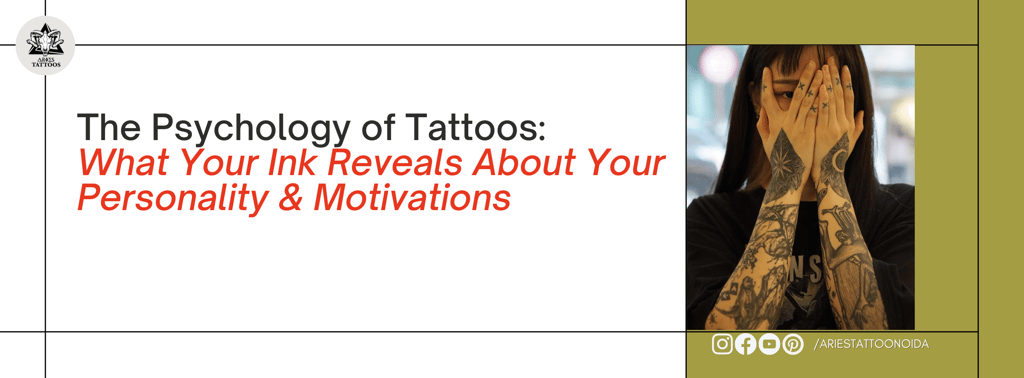The Psychology of Tattoos: What Your Ink Reveals About Your Personality & Motivations
Discover the psychological motivations behind tattoos and what your ink reveals about your personality. Research shows tattoos connect to identity, emotional healing, social belonging, empowerment, and artistic expression. Learn what drives 30% of Americans to get inked and how tattoo placement might reflect your inner psychology.
Andy
4/28/20254 min read
Introduction: The Deeper Meaning Behind Body Art
In today's world, tattoos have evolved from symbols of rebellion to mainstream forms of self-expression. With over 30% of Americans having at least one tattoo, these permanent markings have become a significant cultural phenomenon. But what drives someone to permanently alter their body with ink? The psychology behind tattoos reveals fascinating insights into human behavior, identity formation, and emotional processing.
The Evolution of Tattoo Culture
Tattoos have been part of human history for thousands of years, dating back to ancient civilizations in Egypt, Japan, and Polynesia. What once served as tribal identifiers, spiritual protection, or marks of social status has transformed into a complex form of personal expression in modern society.
According to research published in the Journal of Psychology, the perception of tattoos has dramatically shifted over the past three decades. Once associated primarily with sailors, prisoners, and counterculture movements, tattoos now adorn the bodies of professionals, celebrities, and people from all walks of life.
The Top 5 Psychological Motivations for Getting Tattoos
1. Personal Identity and Self-Expression
Many people choose tattoos as a way to express who they are or aspire to be. Dr. Viren Swami, a professor of social psychology, explains: "Tattoos often serve as external manifestations of internal narratives. They allow individuals to visually communicate aspects of their identity that might otherwise remain hidden."
Research shows that tattoos frequently represent:
Core values and beliefs
Cultural or religious affiliations
Significant life transitions
Professional or creative passions
2. Emotional Processing and Trauma Recovery
Tattoos can play a powerful role in emotional healing. Many individuals get inked as part of processing grief, overcoming trauma, or commemorating significant life events.
A 2022 study in the American Journal of Human Behavior found that 43% of participants with tattoos described their body art as having therapeutic value, helping them to:
Memorialize loved ones
Reclaim their bodies after trauma or illness
Mark important life transitions
Create permanent reminders of personal strength
3. Group Belonging and Social Connection
Humans naturally seek belonging, and tattoos can serve as powerful tribal markers. From military units to sports fans, shared tattoo imagery creates instant recognition among group members.
"When we see someone with similar tattoo imagery or placement, we experience an immediate sense of kinship," explains social anthropologist Dr. Maya Hernandez. "These visual signals can bypass verbal communication entirely, creating instant connection."
4. Control and Empowerment
In a world where much lies beyond our control, tattoos represent a deliberate choice about one's body. This aspect is particularly significant for individuals who have experienced circumstances where their autonomy was compromised.
The permanent nature of tattoos also represents commitment and the courage to make lasting decisions, which can be empowering for many individuals. The physical endurance required to sit through tattooing can itself be a rite of passage, symbolizing personal strength.
5. Aesthetic Appreciation and Artistic Expression
For many, the motivation is simply aesthetic—the appreciation of tattoos as an art form. The human body becomes a canvas, and the tattoo a permanent exhibition of artwork that resonates with the individual.
"There's something profoundly intimate about wearing art that moves with you through life," notes art therapist Jennifer Liu. "Unlike art hanging on a wall, tattoos integrate visual expression with personal identity in a unique way."
The Psychological Benefits of Tattoos
Research suggests that tattoos can provide several psychological benefits:
Enhanced self-image - Many people report improved body image and self-confidence after getting tattoos that accentuate or transform features they previously felt insecure about.
Catharsis and emotional release - The physical sensation of being tattooed, combined with the symbolic meaning of the image, can create a powerful emotional release.
Increased sense of control - Making permanent changes to one's body can reinforce a sense of autonomy and self-determination.
Community connection - Visible tattoos can facilitate connections with like-minded individuals, creating opportunities for social bonding.
What Your Tattoo Placement Might Reveal
Psychological research suggests that tattoo placement choices may correlate with certain personality traits:
Visible areas (hands, neck, face): Often indicates comfort with public identity expression and less concern about social judgment
Private areas: May reflect more personal meanings or a desire to control who shares in the tattoo's significance
Symmetrical placement: Can indicate a preference for balance and harmony
Pain-intensive areas: Sometimes chosen by individuals with higher pain tolerance or those seeking transformative experiences
The Psychological Impact of Tattoo Regret
While most tattooed individuals report satisfaction with their choices, approximately 25% experience some form of regret. The psychological impact of an unwanted tattoo can include:
Decreased self-esteem
Social anxiety
Persistent negative emotions
Financial stress related to removal procedures
Psychologists recommend thoroughly considering tattoo decisions and choosing designs and artists that align with long-term identity rather than momentary trends.
Conclusion: Ink as a Window to the Psyche
Whether motivated by self-expression, emotional processing, group belonging, empowerment, or aesthetic appreciation, tattoos provide fascinating insights into human psychology. Far from being merely decorative, these permanent markings often represent deeply meaningful aspects of identity and personal history.
As tattoo culture continues to evolve, so too does our understanding of the complex psychological factors that drive people to permanently alter their bodies with ink. Whatever the motivation, one thing remains clear: for millions of people worldwide, tattoos are much more than skin deep—they're external expressions of our internal landscapes.
FAQs About Tattoo Psychology
Do tattoos indicate specific personality traits?
While no definitive correlation exists between having tattoos and specific personality traits, research suggests that tattooed individuals may score slightly higher on measures of sensation-seeking and openness to experience.
Can tattoos help with mental health issues?
Some individuals report therapeutic benefits from tattoos, particularly when the imagery symbolizes personal growth or transformation. However, tattoos should complement professional mental health treatment, not replace it.
Why do some people become "addicted" to getting tattoos?
The combination of endorphin release during tattooing, the emotional satisfaction of self-expression, and the social reinforcement from tattoo communities can create a positive feedback loop that encourages additional tattoos.
Are there psychological differences between those who get one tattoo versus many?
Research suggests that individuals with multiple tattoos often view body modification as an ongoing project of self-expression, while those with single tattoos may attribute more singular significance to their ink.
How do cultural differences impact tattoo psychology?
Cultural context significantly influences both the motivation for and interpretation of tattoos. What might be seen as rebellious in one culture could be a traditional mark of honor or passage in another.


Aries Tattoo Noida
We’re a leading tattoo studio in Noida, delivering top-notch services for over 7 years.
Connect with us
News letter
✉️ hello@ariestattooo.com
📞 +91-8076363878 / +91-8178083852
© 2025. All rights reserved | Made with ❤️ Aries Tattoo Noida
⏱️ Mon-Sun: 11AM - 9PM
